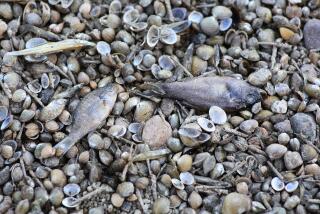Fly fishing for ‘sewer salmon’ in the L.A. River
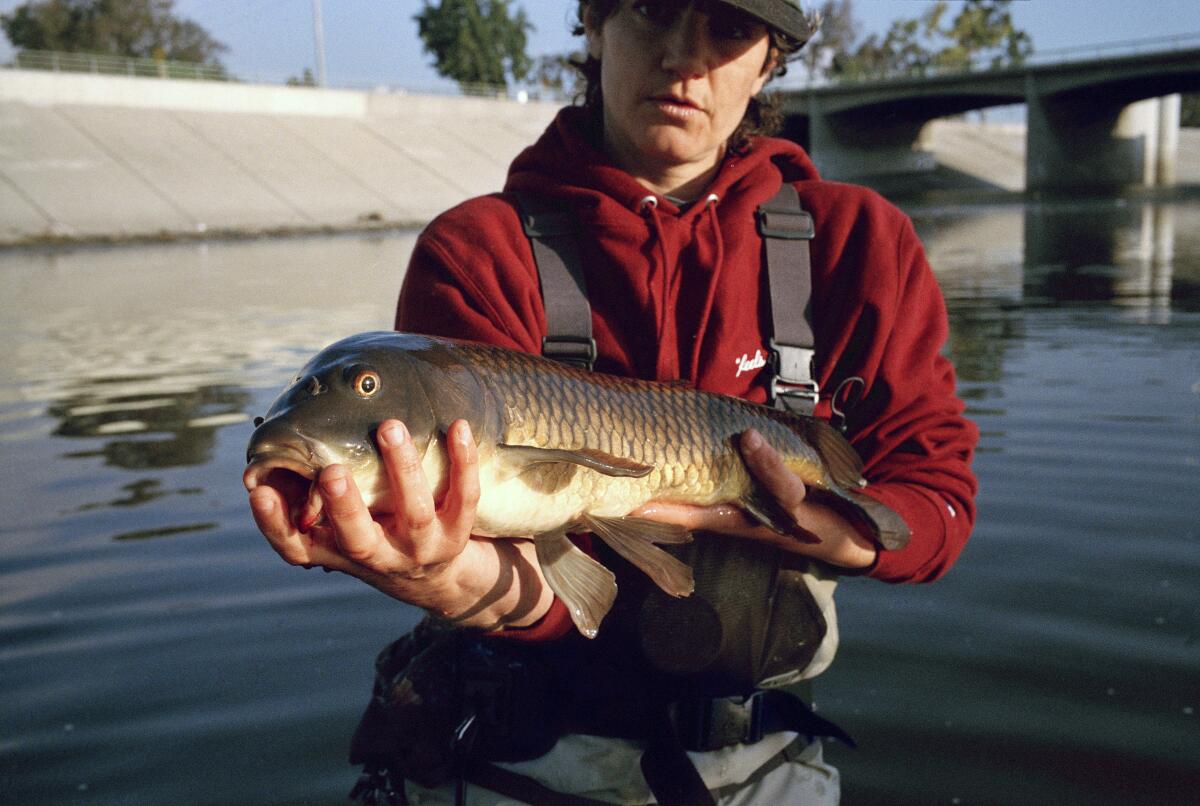
- Share via
At 6 a.m. on a recent Saturday, I donned a borrowed pair of waders with a hole just above the butt, wrestled some waterproof boots over my feet and stepped into the muck of a particularly deep patch of the Los Angeles River.
I came in search of Cyprinus carpio, the common carp, a.k.a. sewer salmon, mud marlin, pond pig, river rabbit, dumpster dolphin, ghetto grouper and septic steelie. If an accumulation of nicknames can be a metric for the amount of affection — however begrudging — that we humans have for a particular animal, it makes sense that the lowly carp is swimming in sobriquets.
Rivers are living organisms that interact uniquely with each of us based on what we want and need from them. Some of us bike alongside the river; some step into the water in $300 waders carrying rods that can cost anywhere from $200 to $1,000, while others are trying to catch a meal using garbage bait on scavenged bits of line.
More than anything, it seems, Angelenos drive above the river and glance down at it with a vague shudder, like, “Ugh, that thing.” It’s sort of an eyesore, a shackled beast that was encased in concrete in the 1930s in an effort to avoid floods by sluicing water to the ocean as quickly as possible. It was effective, yes, that brutalist measure — but it also deprived so much of the city of the kind of direct and quick communion with nature that Thoreau called the “tonic of wildness.” Trekking to the nearest freely flowing stretch of the L.A. River to fish, with all the slow hours of waiting and watching that the sport entails, remains a prime way to befriend nature.
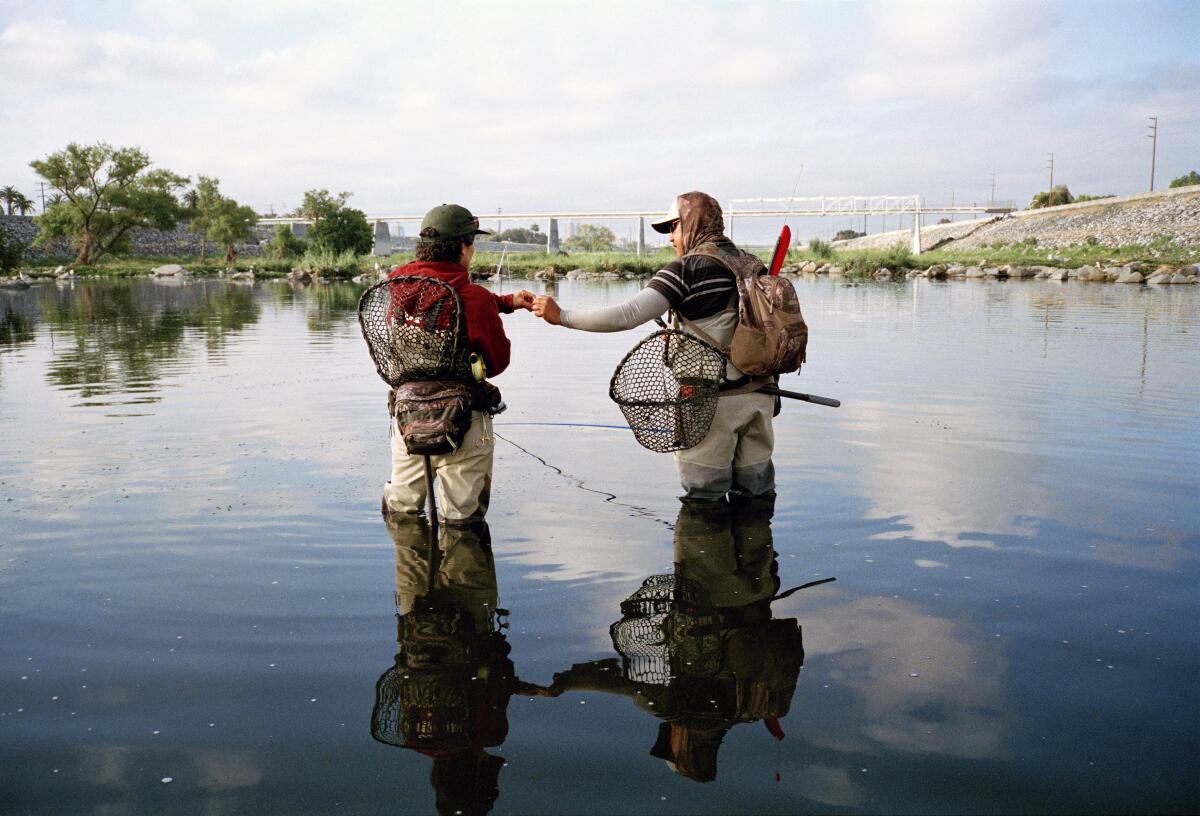
People who fish for carp have a love for them, as I learned when I joined my guides at the middle of the river in Long Beach. Lauren Mollica, a former pro skateboarder who now works primarily as a carpenter, has been fishing the L.A. River for about a year, and she waxes rhapsodic about the scent freshly caught carp leaves on one’s hands (which, I’ll discover soon enough, is intoxicating in its subtle mix of sweetness and brine). Lino Jubilado, a native of Alhambra and Mollica’s mentor, has been fishing L.A.’s waters for more than 30 years. He still laughs each time he sees a carp breach, a functional move that fills its air bladders but also has a playful puppiness to it. These fish are cute.
Mollica grew up in New Jersey, fishing on a traditional reel, and started a trawling posse called Lesbian Fishing Club in New York City, where she fished for stripers and bass in the East River and Prospect Park Lake.
After Mollica moved west, she started to notice fishers, often glimpsed from an overpass while speeding across the L.A. River, casting their lines into that concrete gully. Her girlfriend, Julia, who grew up fly-fishing in Colorado, bought her a fly rod as a gift.

Sign up for the Tasting Notes newsletter
Mollica committed to join the carp fishers’ ranks. She acquired flies and a pair of waders; she read “Carp on the Fly,” the sacred scripture for carpers; she stalked Instagram, relentlessly scrolling through posts geotagged at the river, trying to find potential spots. Then she set out, mainly near the Fletcher Drive overpass that connects Atwater Village and Frogtown, casting and failing again and again.
“It took me about two weeks, just walking up and down the river with my polarized glasses, hunting,” she said. “If your fly hits the water too hard, they spook, so you have to see the fish, cast above it, and let the fly float down right into its mouth. Catching my first one was insane! I might have cried.
“And after that,” she said, “I was coming back three days a week.”
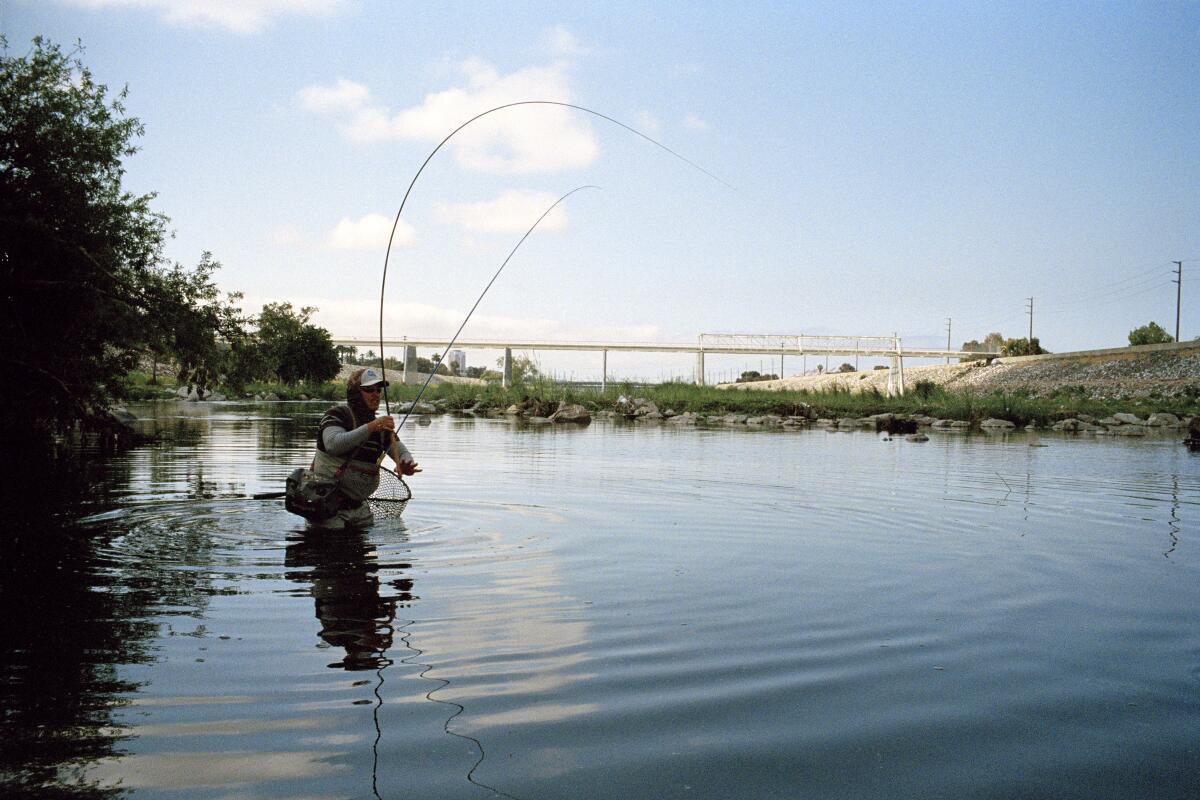
By posting photos of her catches on Instagram with copious hashtags, she found the carp freaks of L.A., among them Jubilado, a linchpin of the Los Angeles River fishing scene. Jubilado’s evangelistic fervor for fishing is infectious. One of his favorite things to do is take novices out on the river and shepherd them through hooking their first carp; his Instagram feed is full of people proudly holding up their first wet, squirming trophy.
Recently, Jubilado graduated from the standard fly reel to the even more purist tenkara method, which uses a line, a rod and a fly — but no reel.
“It’s just a fixed line,” he said. “It’s actually the simplest way to fly-fish but also the most challenging. You’re using the backbone of the rod as your reel, letting the bend do its thing.”
Since adopting this new technique a couple of seasons ago, Jubilado’s numbers have exploded. “I’ve lost count of how many I’ve caught on the tenkara,” he said, but estimates it’s around 500.
Jubilado has become a star in the local carping community. A lecture he gave last month at the Orvis shop in Pasadena, a hot spot for the hobby, was filled with fellow fishers who jotted notes while he delivered a veritable TED Talk on carp anatomy and behavior, techniques and tips, and fly-tying.
With the number of hours he’s logged out there, Jubilado has seen the best and the worst our river has to offer.
“There are sections of the L.A. River that are very nice, very peaceful,” he said. “If I brought you up there blindfolded, stood you in the middle of the water, you’d be standing in a river like any other. Everything’s wild.”
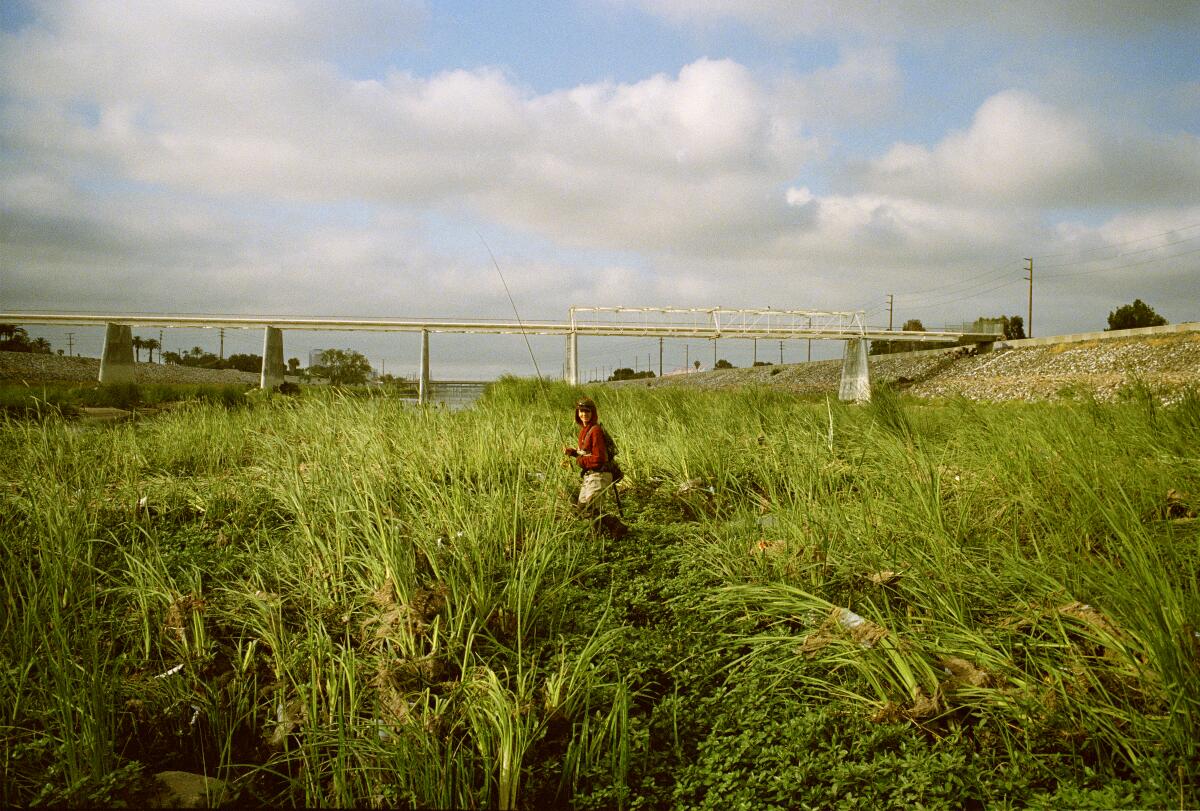
But he is no stranger to the sordid side of the river. Today he’s employed as a school nurse, but he used to work on the frontlines of outreach to the city’s homeless population, administering psych meds, often by the side of the river.
“It was field-based work for chronically mentally ill patients that were homeless,” he said. “It was a housing-first model, but of course we had those that just could not be housed. So I would have to treat them in the field, meeting them wherever I could to give them their shot.”
Homeless people are forced by their circumstances to be resourceful in ways that more secure Angelenos are not. Some fish the river for more than sport. “I know they’re eating [the carp]. I also know that they are eating the ducks,” says Jubilado, who has found butchered waterfowl on the river’s edge. “We’re talking about ducks that are intact, just missing the breast. Somebody knew what they were doing when they breasted these.”
But Jubilado has seen far worse than cut-up ducks on the river. In January, he and his brother found a dead body while fishing near Atwater. “Every time we hang up a line, we joke, ‘Oh, my God. I hope this isn’t a dead body I’m snagged onto,” he said. “But this one particular time, we were standing in this pool and my brother goes, ‘Is that what I think it is?’”
It was. How close were you, I ask. “Thirty yards? Forty yards? Real close. I started making my way over there and then I immediately called the police.”
Jubilado and his brother had found Royalyn Reshaye Starks, a 55-year-old Los Angeles woman. After the cops told Jubilado her name, he found her Instagram account. “That made it more real,” he said. “I mean, you get to see the human side of her. Family, friends. [The police] suspected that it wasn’t foul play. Drugs were involved, maybe.”
Connected to the river
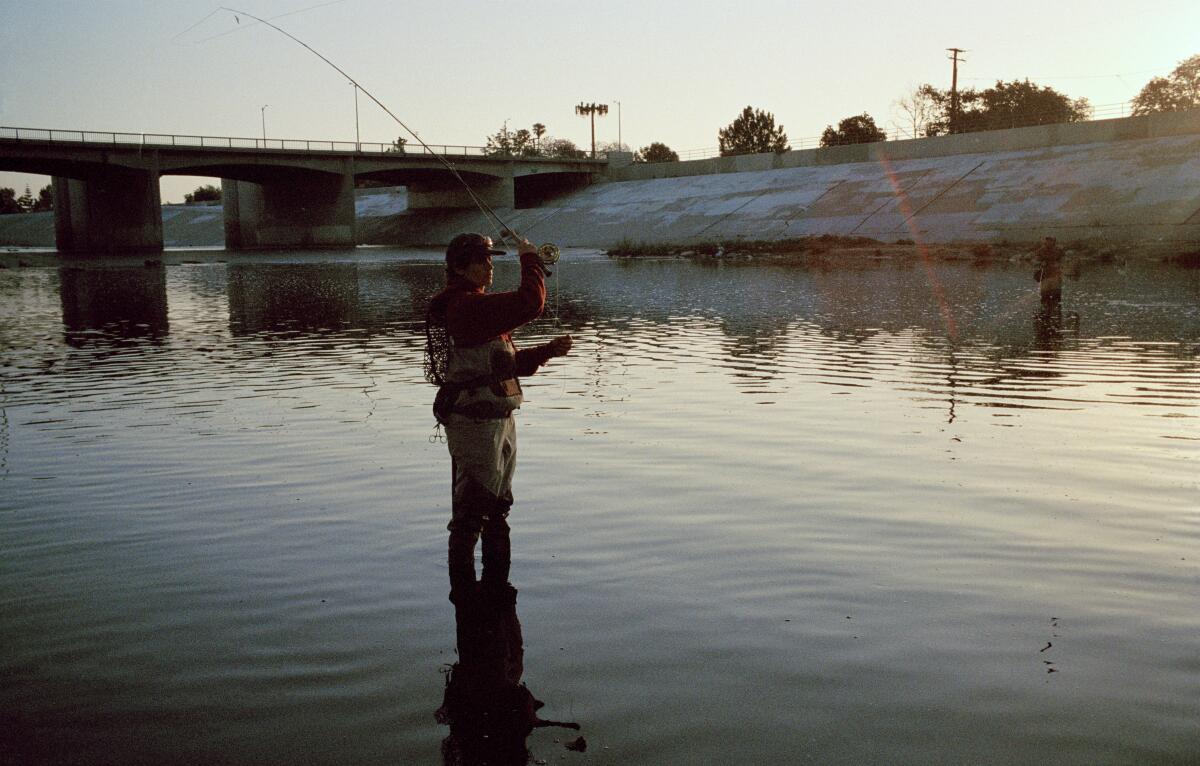
Melanie Winter, director of the River Project, a nonprofit dedicated to the betterment of Southern California’s waterways, sees fishing as good for the cause of conservation. “The people who fish — and the birders — absolutely have a positive effect on the river,” she said. “[They] develop a love for the river and are super-valuable champions.”
From her perspective, returning native species such as rainbow trout and chinook salmon, neither of which survived the concretization of the river more than 80 years ago, while removing as many of the invasive carp as possible, would be a major step in fixing the ailing river. “I would love for the fisherpeople to get all that carp out of the river,” she said, laughing.
“When people develop that love and appreciation for the river and its tributaries, for our native ecosystem,” Winter said, “they [also develop the] understanding that it’s essential for our ability to thrive in the coming century.”
The feeling of the first catch
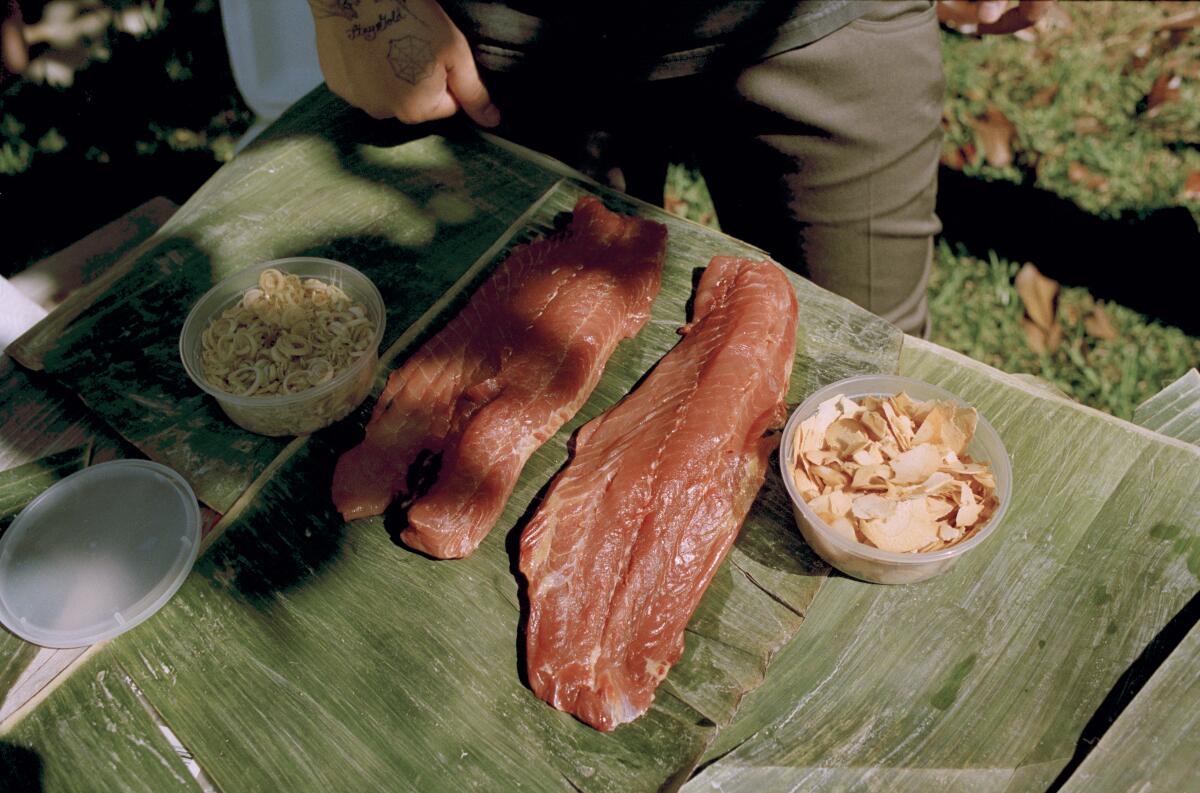
About an hour into my first morning fishing session, I cast my fly into a scum line, a foamy rivulet of mysterious particulate matter, which lies on top of the deeper water that skirts the side of a messy island in the middle of the river. Jubilado told me it was prime real estate for carp snagging. Almost immediately, there’s a tug. I pull back, and my rod bends into an arc of alarming curvature. Jubilado and Mollica wade over to me — somewhat laboriously, as the mud at the river’s bottom sucks hungrily each time you plant a boot in it.
As I battle the unseen foe at the end of my line, I find that it’s a game of angles and rhythm. Hold the fish tight for a bit, let it loose so it can play out for a moment, then take the slack off again and reel in the line a little. At the same time, rotate the rod. Bring it parallel with the water on one side of you and then the other. It’s a dance you have to do with the fish, and eventually, Neptune willing, your partner tuckers out. After a few tantalizing peeks at my catch as it breaks the surface closer and closer to me, Jubilado is able to step in and net it. The thrill, the rush of the payoff, is palpable. I’ve hooked me a chubby little carp, eyeballed by Jubilado to be around 4 pounds. It spazzes once or twice in the net, then lies still.
Mollica coaches me in picking it up: one hand under its head and the other just behind its belly. Hold it firmly but don’t squeeze. Mouth plopping open and shut, it settles in my grip, perhaps resigned to whatever might be next. After a few seconds of savoring its smooth, cool skin and satisfying heft — sort of like a slimy, hairless house cat — I lower it back into the water and let it go. Jubilado, videoing on his phone, asks me to say something to the fish as it swims away and all I can think of in the moment is, “Thanks, buddy. Maybe I’ll see you again later.”
Safe to eat?
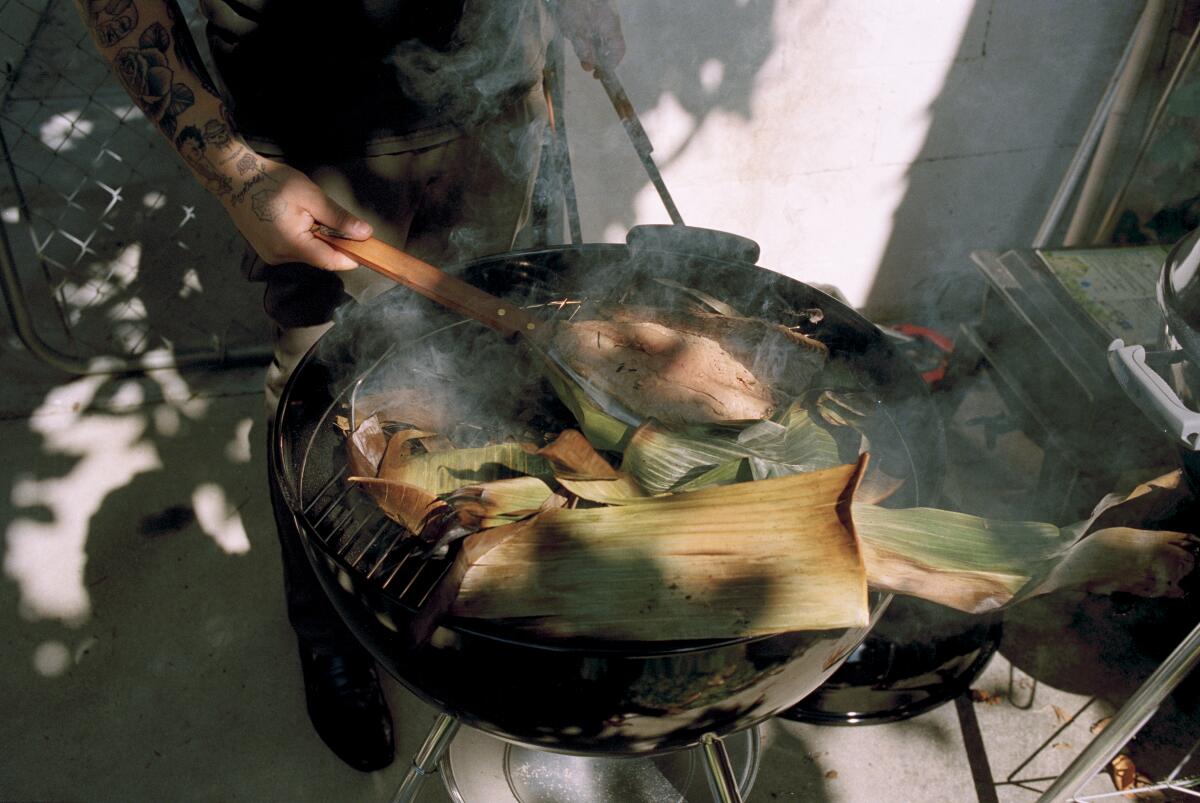
A few curious souls, including fish whisperer Jubilado and Night + Market chef-owner Kris Yenbamroong, gathered in my Mount Washington backyard, where Yenbamroong prepared larb, a traditional Thai meat salad, using carp that was caught in the L.A. River at Long Beach just hours earlier.
Before our meal, I asked Sabrina Drill, an expert in urban ecology and aquatic invasive species, if we were idiots for doing this.
In 2007, Drill took part in a study of toxicity levels in L.A. River-caught fish including carp. They were tested for fillet content of PCBs and mercury, and all the fish were under the California Office of Environmental Health Hazard Assessment’s limit for those contaminants.
“Now, we didn’t test them for everything,” she cautioned. “It wasn’t a huge sample size, and it wasn’t a study that was designed for the primary intent to answer the question: Is it safe to consume [these] fish?”
She noted that 90% of the water in the L.A. River — with some variation due to rainfall — is outfall from water treatment plants. Though that sounds gross, Drill said, “In terms of water quality, it’s actually pretty good. There’s more oversight on what comes out of those plants than there is on what comes out of the water vending machines outside a grocery store.”
Does this mean that Drill would try eating L.A. River carp?
“I don’t want you to quote me as saying it’s safe,” she said. “But now that I’m no longer pregnant and breastfeeding? Yeah, I’d try it once.”
Somewhat heartening. But still, hoping to reduce any riverine poisons in the fish, which was pulled from a stretch full of rusty shopping carts, stinky muck and copious garbage, Jubilado meticulously bled and filleted his catch immediately after netting it.
The meat was a dark, rich red similar to bonito in look and feel. After steaming on the grill, the flesh turned white. A pinch taken directly from the fillet and eaten preseasoning was oily to the point of unctuousness. Yenbamroong, while making the larb, commented that the carp felt “like something you should cook; it feels texturally right from a cook’s perspective.”
As for the flavor: Was it the psychological factor that added a ghostly taste of garbage and offness to it? Probably. Really it just tasted like basic river or lake fish; a couple of levels below delicacy, sure, but perfectly within the realm of edible. More of a Ralphs than a McCall’s purchase. The larb was delicious, vibrant and tangy. It was similar enough to catfish larb that we had to willfully stop ourselves at just a few bites just in case.
Los Angeles River Backyard Carp Larb
1 hour. Serves 6 to 8.
Ingredients
- 2 medium Los Angeles River carp fillets, roughly 2½ to 3 pounds
- ¼ cup finely minced fresh galangal
- 1 teaspoon granulated sugar
- 2 tablespoons fish sauce
- 2 tablespoons chile powder
- 2 tablespoons thinly sliced lemongrass
- ½ of a red onion, thinly sliced
- ½ cup roughly chopped cilantro, with stems
- 12 mint leaves, torn
- ½ cup thinly sliced green onions
- ½ cup chopped sawtooth (culantro)
- 2 tablespoons nam pla ra (Thai fermented fish liquid)
- ¼ cup fresh lime juice
- 1½ tablespoons toasted rice powder (buy the Night + Market cookbook to learn how to make this manna from heaven)
- Green cabbage wedges, sliced cucumber and Thai sticky rice, for serving
Instructions
- Preheat a grill to medium high heat. If you can get them, we suggest using Pok Pok brand Thaan Thai charcoal logs, which are similar to Japanese binchotan.
- Wrap the carp fillets in the banana leaves, securing each packet with kitchen twine. Grill, flipping now and then, until cooked through. Thirty minutes should do it.
- Remove the fish from the grill and unwrap it. When it’s cool enough to handle, use a fork and your hands to separate the bones from the flesh. These fish are bony. Be thorough.
- Once you have about 2 cups of meat, place it in the center of a large cutting board and cover it with the minced galangal. Use a cleaver to chop this pile into a rough paste. This will take a couple of minutes.
- Move the mixture to a large bowl, stir in the sugar and fish sauce and mix. Next, add the seasonings in this order and with a quick toss after each addition: chile powder, lemongrass, red onion, cilantro, mint, green onions, sawtooth, nam pla ra, lime juice and toasted rice powder. Serve with a wedge of green cabbage, sliced cucumber and sticky rice. Have about five bites, then leave the bowl curbside for the coyotes.
Adapted from “Night + Market” by Kris Yenbamroong, Clarkson Potter 2017
More to Read
Eat your way across L.A.
Get our weekly Tasting Notes newsletter for reviews, news and more.
You may occasionally receive promotional content from the Los Angeles Times.

